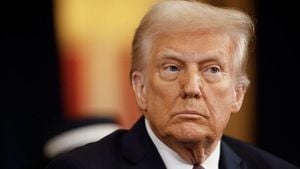Germans are heading to the polls today, February 23, 2025, for a pivotal federal election marked by economic stagnation, pressures to curb migration, and rising worries over the future of Ukraine and Europe’s alliance with the United States. The election is poised to reshape Germany’s leadership as it faces the most significant political change seen since the end of World War II.
Leading the charge is Friedrich Merz, the leader of the center-right Christian Democratic Union (CDU). At 69, Merz is seen as the frontrunner to succeed incumbent Chancellor Olaf Scholz of the Social Democratic Party (SPD). Polls suggest Merz's CDU is predicted to secure the largest share of votes, but coalition talks will likely be necessary as no absolute majority is expected.
Many voter concerns center on the economy and immigration. Germany, as the largest economy within the 27-nation European Union, has been dealing with prolonged stagnation. According to multiple reports, Merz has promised to steer the country with a tougher rightward shift, aiming to reclaim voters from the far-right Alternative for Germany (AfD). The AfD has surged recently, with polls potentially putting them second, benefiting from growing unrest and discontent among the electorate.
The AfD has gained traction due to recent violent incidents, including stabbings and car attacks attributed to asylum seekers, sparking public fear and debate. The public's reaction has been significant; polls show unprecedented support for the far right's stance, leading some to describe the election as potentially transformative for Germany and the entire continent.
"This federal election will attract attention like never before," said Merz during his final campaign rally. He highlighted the international focus on Germany, citing the need for the nation to reclaim its role and status on the world stage amid turbulent global relations, particularly with the visible shift from U.S. President Donald Trump's administration.
Scholz, casting his vote alongside his wife Britta Ernst, remarked on the challenging state of affairs, emphasizing, "We need a strong European Union. Otherwise, we will not be able to cope with many new powers…" His call reflects the growing anxiety around security ties, especially with the U.S. under Trump's leadership.
Trump's approach to Europe has become increasingly confrontational since he took office, raising fears among Germans about potential trade wars and deteriorated relations, which could affect their economy adversely. Local voters, including Daniel Hofmann, expressed concerns. He stated, “Right now we are going through very uncertain times. There must be change, transformation.”
Coalition talks following the election outcome are nearly guaranteed, with observers noting how single parties rarely achieve majority control. The volatile political climate, combined with tensions from the potential rise of the AfD, sets the stage for complex negotiations among parties after the results are finalized.
Polling places across Germany have witnessed long lines and high participation rates, with around 59 million citizens eligible to vote. Significant undecided voter numbers—20%—remain, illustrating the uncertainty surrounding the outcome and potential voting patterns. Given the heightened political climate and tumultuous recent events, the electorate is faced with determining the future path for their country.
Michael Broening, a political analyst, insists, "The stakes could not be higher," referring to the challenges faced by mainstream parties to convince voters to reject the far-right. He asserts, “Germany's establishment parties have consistently failed to convince voters to reject the far right, and this election could be their last chance to turn the tide.”
The Afd party has rallied significant support from the disenchanted populace, capitalizing on fears surrounding immigration and socio-economic welfare. The party's controversial policies have proliferated across various platforms, leading to increased visibility and engagement from potential voters.
Merz has indicated the party intends to capitalize on AfD concerns moving forward, acknowledging the myriad challenges posed by their recent popularity. If coalition-building is unsuccessful, it can lead to heightened unrest among voters who feel unrepresented.
Poll closing is projected shortly after 18:00 local time, with first estimates and projections anticipated. For the citizens of Germany, the day's results will influence not only the immediate political structure but the broader relationship dynamics within Europe as it grapples with newly defined roles on the international stage.
After the results surface, Scholz will remain the caretaker Chancellor until the new multi-party coalition can establish itself—an endeavor Merz has stated he aims to achieve and finalize within two months.
The 2025 German Federal Election might well turn out to be a defining moment, prompting political shifts both within Germany and across Europe as both traditional and far-right parties vie for control during these uncertain times.



